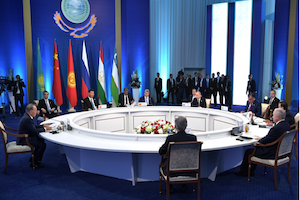Coordinating the Corridors
S. Frederick Starr
March 20, 2025
This article was originally delivered as a speech in March 2025 at an Asian Development Bank conference on connectivity and trade under their Central Asia Regional Economic Cooperation Program.
Read Coordinating the Corridors (PDF)
Pakistan in the SCO: Challenges and Prospects
By Rizwan Zeb
February 8, 2018, the CACI Analyst
The Shanghai Cooperation Organization’s (SCO) Council of Heads of Government (CHG) held its 16th meeting on November 30-December 1, 2017. Pakistan’s PM Shahid Khaqan Abbasi highlighted the pivotal role that Islamabad can play in achieving the SCO’s objectives by serving as a bridge between Central and South Asia. However, in order to realize the potential benefits of Pakistan’s SCO membership, Islamabad needs to intensify its public diplomacy and improve its standing among the other member states by aligning its policy with other regional powers. Is Islamabad ready to do this?

Pakistan to repatriate Afghan refugees
By Sudha Ramachandran
February 9, 2017, the CACI Analyst
Pakistan’s government has set March 31 as the deadline for all Afghan refugees living on its soil to leave the country or face deportation. Although it is not a signatory to the 1951 Refugee Convention or the 1967 Protocol, Pakistan has been a generous host to Afghan refugees, hosting up to 5 million Afghans at a time. Neither did Pakistan force them in the past to return to Afghanistan. This seems to have changed. For many refugees, returning to Afghanistan will not be a happy homecoming as the security and economic situation in the country remain dire.
New signs of Chinese military interest in Central Asia
By Stephen Blank
January 16th, 2017, The CACI Analyst
Recent evidence shows a gradual increase in Chinese military activity in Central Asia, particularly with Tajikistan, Afghanistan, and Pakistan, although China has for years denied any military interest in the region. In October, PLA and Tajik forces jointly participated in counterterrorism exercises in Tajikistan near the border with Afghanistan, following earlier activity in 2016. Whereas Tajikistan was then silent, this time it publicized the exercises, which aroused a visible anxiety in the Russian media although the Russian government has hitherto been unwilling to comment on this issue. China’s initiative could imply a major new development in Chinese policy and in Central Asia’s overall security, with lasting implications for the region.
Deeper Afghanistan-India cooperation must not isolate Pakistan
By Sudha Ramachandran
December 15th, 2016, The CACI Analyst
India-Afghanistan relations have warmed considerably in recent months. During Afghan President Ashraf Ghani’s visit to Delhi in mid-September, the two countries deepened their defense and security co-operation and signed an extradition treaty. India also pledged US$ 1 billion towards capacity building in Afghanistan. A few days later, when the Lashkar-e-Taiba, a terrorist group with close links to Pakistan’s Inter-Services Intelligence (ISI), attacked an Indian Army base at Uri in Jammu and Kashmir, Afghanistan came out strongly in support of India. The renewed Delhi-Kabul bonding is likely to have stirred Islamabad’s anxieties. ISI and its terrorist protégés could step up attacks in Afghanistan and India in the coming months.






